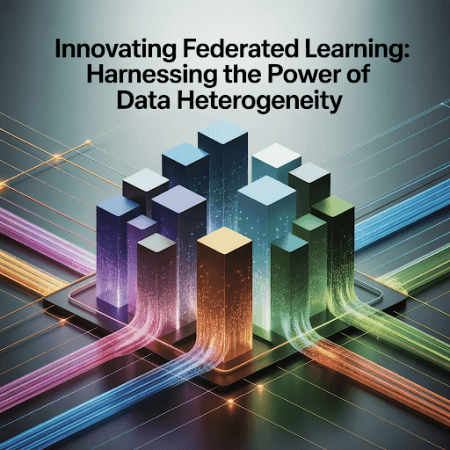
In the rapidly advancing field of artificial intelligence (AI), federated learning has emerged as a promising approach to create intelligent systems while preserving user privacy. In his insightful article, Kuldeep Deshwal explores how federated learning systems can be enhanced through innovative solutions to manage data heterogeneity. With the growing adoption of AI technologies across various sectors, understanding and addressing data heterogeneity is key to achieving more efficient, personalized, and secure learning systems.
Embracing Privacy with Federated Learning
Federated learning revolutionizes machine learning by keeping data on individual devices, training models locally, and sending only updates to a central server. This decentralized approach enhances privacy and reduces bandwidth and energy use. However, data heterogeneity poses a challenge, as the variation in data across devices can hinder model effectiveness. He explores innovative solutions to overcome this issue, ensuring federated learning systems can perform well despite diverse data.
Understanding Data Heterogeneity
Data heterogeneity in federated learning refers to the differences in data collected across devices, influenced by factors like user behavior, device type, and location. Each device holds unique, often non-IID (non-independent and identically distributed) data, leading to significant variations between devices. For example, one user's text-heavy data differs greatly from another's image and video-based data, which poses challenges for maintaining the accuracy and efficiency of federated models.
Navigating the Complexity of Feature and Label Distribution Skew
Feature and label distribution skew arise when data characteristics and outcomes vary significantly across devices. Feature skew occurs when factors like language or content type differ by geography or user group. Label skew happens when certain outcomes are more common in some contexts, such as specific illnesses treated in certain hospitals. These disparities can hinder model accuracy. However, techniques like data augmentation and re-weighting can help address these imbalances, promoting more balanced learning and improving model performance across diverse datasets.
Turning Heterogeneity into an Advantage
Data heterogeneity, though challenging, offers significant advantages when managed well. Federated learning can create personalized models tailored to individual user data, improving relevance and effectiveness. For example, a voice assistant can adapt to a user's specific accent without compromising privacy. Additionally, embracing data diversity allows models to generalize better to new, unseen scenarios, making them more adaptable in real-world applications. This approach enhances model robustness, ensuring it meets various user needs and preferences, ultimately improving performance.
Tackling the Convergence and Communication Challenges
Federated learning faces challenges in stable convergence due to conflicting updates from devices with varying data, which can slow the process. Communication inefficiency, requiring multiple rounds of updates, adds to the difficulty. Solutions like personalized federated learning, robust aggregation methods, and federated distillation enhance model efficiency and effectiveness, accommodating diverse data distributions across devices.
The Future of Federated Learning
Future advancements in federated learning include improved heterogeneity metrics to better manage data variations. The growing prominence of cross-silo federated learning will necessitate solutions for addressing data differences across organizations. Key factors for enhancing federated learning's robustness and adaptability will include dynamic adaptation techniques, hardware-aware federated learning approaches, and the development of standardized benchmarks to ensure effective performance in evolving environments.
In conclusion, federated learning has already proven to be a game-changer in privacy-preserving AI systems. By addressing the challenges posed by data heterogeneity, Kuldeep Deshwal has presented a comprehensive overview of how innovative strategies can be employed to enhance federated learning. The future of federated learning is bright, and as the technology matures, it will offer even more powerful and personalized solutions that serve diverse user needs while ensuring privacy and efficiency. With continued research and development, the potential for federated learning to revolutionize industries like healthcare, finance, and mobile applications is immense.

















